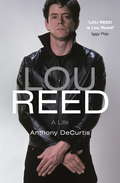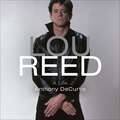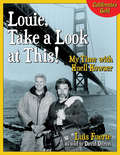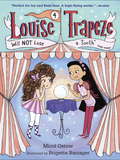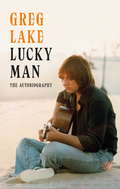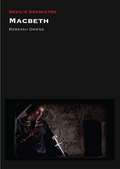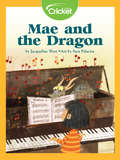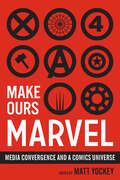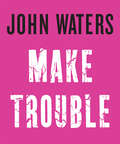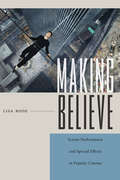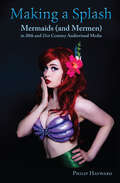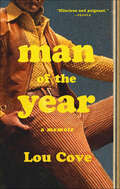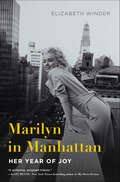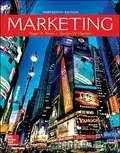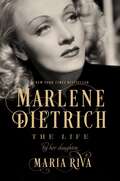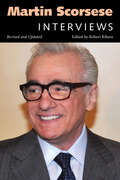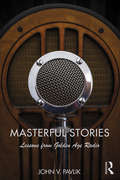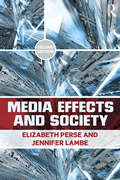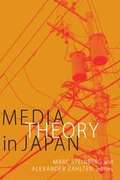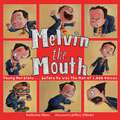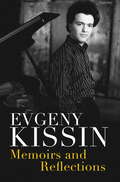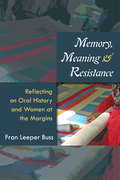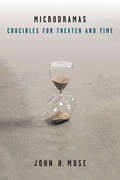- Table View
- List View
Lou Reed: Radio 4 Book of the Week
by Anthony DeCurtisA GUARDIAN AND CHOICE BOOK OF THE YEAR'A walk on the wild side with the alt-rock pioneer' GQ'DeCurtis is well placed to trace Reed's five-decade career, drawing on insider knowledge but skilfully balancing it with detailed research and fascinating interviews' Mojo MagazineAs lead singer and songwriter for the Velvet Underground and a renowned solo artist, Lou Reed invented alternative rock. His music, at once the height of sanctity and perversity, transcended a genre, speaking to millions of listeners, inspiring a new generation of musicians, and forever changing the way we think of that iconic era of sex, drugs, and rock 'n' roll. Throughout his five-decade career, Reed embodied artistic self-awareness and captured the beauty, paranoia, and vivacity of his time into an array of hit songs, experimental albums, and a larger-than-life persona. With such masterpieces as 'Sweet Jane' and 'Walk on the Wild Side', Reed exerted an influence on popular music rivaled only by the likes of Bob Dylan and the Beatles and is recognized to this day as one of the greatest musicians of the 20th century.Now, just a few years after Reed's death, comes the thrilling, provocative story of his complex life. An acclaimed Rolling Stone contributor, Anthony DeCurtis interviewed Reed extensively and knew him well. With unparalleled access to Reed's friends, family, and dozens of other intimate relations, DeCurtis brings Reed's story compellingly alive and deepens our understanding of his indelible music. We travel deep into the underground artist clubs, listen along in the studio as the Velvet Underground record their signature work, and revel in Reed's relationship with legendaries like Andy Warhol, Patti Smith, and David Bowie. Insightful, revelatory, and intimate, Lou Reed is a gripping tribute to a quintessential American icon.
Lou Reed: Radio 4 Book of the Week
by Anthony DeCurtisA GUARDIAN AND CHOICE BOOK OF THE YEAR'A walk on the wild side with the alt-rock pioneer' GQ'DeCurtis is well placed to trace Reed's five-decade career, drawing on insider knowledge but skilfully balancing it with detailed research and fascinating interviews' Mojo MagazineAs lead singer and songwriter for the Velvet Underground and a renowned solo artist, Lou Reed invented alternative rock. His music, at once the height of sanctity and perversity, transcended a genre, speaking to millions of listeners, inspiring a new generation of musicians, and forever changing the way we think of that iconic era of sex, drugs, and rock 'n' roll. Throughout his five-decade career, Reed embodied artistic self-awareness and captured the beauty, paranoia, and vivacity of his time into an array of hit songs, experimental albums, and a larger-than-life persona. With such masterpieces as 'Sweet Jane' and 'Walk on the Wild Side', Reed exerted an influence on popular music rivaled only by the likes of Bob Dylan and the Beatles and is recognized to this day as one of the greatest musicians of the 20th century.Now, just a few years after Reed's death, comes the thrilling, provocative story of his complex life. An acclaimed Rolling Stone contributor, Anthony DeCurtis interviewed Reed extensively and knew him well. With unparalleled access to Reed's friends, family, and dozens of other intimate relations, DeCurtis brings Reed's story compellingly alive and deepens our understanding of his indelible music. We travel deep into the underground artist clubs, listen along in the studio as the Velvet Underground record their signature work, and revel in Reed's relationship with legendaries like Andy Warhol, Patti Smith, and David Bowie. Insightful, revelatory, and intimate, Lou Reed is a gripping tribute to a quintessential American icon.
Louie, Take a Look at This!: My Time with Huell Howser
by David Duron Luis FuerteHuell Howser, the exuberant, hugely popular host of California Gold and other California public-television shows, was always exclaiming to the camera, "Louie, take a look at this!" Now, three years after Howser's death, Louie-aka Luis Fuerte, a 5-time-Emmy-winning cameraman-shares all the great stories of their adventures exploring California, making great television, and showcasing Howser's infectious love for the Golden State.
Louise Trapeze Will NOT Lose a Tooth
by Micol Ostow Brigette Barrager“Perfect for Ivy and Bean fans. A high-flying series.” —Booklist The Louise Trapeze chapter books are perfect for circus-lovers and fans of JUNIE B. JONES, with adorable illustrations from Brigette Barrager, illustrator of the New York Times bestseller UNI THE UNICORN. Fact: Louise Trapeze never loses anything. Things just go missing! Like her dazzling light-up hula hoop and her polka-dot sandals. But Louise isn’t going to lose another thing, ever. No way! Not even if an amazing fortune-teller predicts that she will lose something priceless. And especially not when her tooth starts to feel wiggly-jiggly . . .
Lucky Man: The Autobiography
by Greg LakeGreg Lake first won acclaim as lead vocalist, bass guitarist and producer when, together with Robert Fripp, he formed King Crimson. Their first album, the landmark In the Court of the Crimson King, co-produced by Greg, featured the iconic song '21st Century Schizoid Man'. King Crimson pioneered progressive rock and paved the way for many famous bands that followed, from Yes and Genesis to the Red Hot Chilli Peppers.In 1970 Greg met fellow legend Keith Emerson during a North American tour; the two shared common bonds: European musical influences and a desire to reinterpret classical works while creating a new musical genre. After being introduced to drummer Carl Palmer, they formed the first progressive rock supergroup Emerson, Lake and Palmer.To date ELP has sold over 50 million records. Lake produced Emerson, Lake & Palmer, Tarkus, Pictures at an Exhibition, Trilogy, Brain Salad Surgery, Works Vol. 1 and 2, and two different live albums. All went platinum and featured a series of hit singles, most written and all sung by Lake. The three created a unique live theatrical performance which featured Emerson attacking his keyboards with knives, Palmer playing a 2.5 ton stainless steel kit and Lake performing on a £6,000 Persian rug which had its own roadie. One of their very first performances was at the historic Isle of Wight Festival in 1970 and they went on to headline California Jam, one of the biggest concerts of the 1970s, attended by 350,000 people.Probably the voice of his generation, Greg fronted the greatest rock supergroup of the 1970s but never held with the 'progressive' tag that attached itself to both the music and the excess. Lucky Man not only charts the highs and lows of a career in rock music but also reflects on the death of Keith Emerson last year, living with terminal cancer and the end of life. Greg can best be summed up by his now-famous line: 'Material wealth is a very fleeting pleasure ... when you can buy anything you want and do anything you want, you soon discover that you actually don't want any of it.'
Lucky Man: The Autobiography
by Greg LakeGreg Lake first won acclaim as lead vocalist, bass guitarist and producer when, together with Robert Fripp, he formed King Crimson. Their first album, the landmark In the Court of the Crimson King, co-produced by Greg, featured the iconic song '21st Century Schizoid Man'. King Crimson pioneered progressive rock and paved the way for many famous bands that followed, from Yes and Genesis to the Red Hot Chilli Peppers.In 1970 Greg met fellow legend Keith Emerson during a North American tour; the two shared common bonds: European musical influences and a desire to reinterpret classical works while creating a new musical genre. After being introduced to drummer Carl Palmer, they formed the first progressive rock supergroup Emerson, Lake and Palmer.To date ELP has sold over 50 million records. Lake produced Emerson, Lake & Palmer, Tarkus, Pictures at an Exhibition, Trilogy, Brain Salad Surgery, Works Vol. 1 and 2, and two different live albums. All went platinum and featured a series of hit singles, most written and all sung by Lake. The three created a unique live theatrical performance which featured Emerson attacking his keyboards with knives, Palmer playing a 2.5 ton stainless steel kit and Lake performing on a £6,000 Persian rug which had its own roadie. One of their very first performances was at the historic Isle of Wight Festival in 1970 and they went on to headline California Jam, one of the biggest concerts of the 1970s, attended by 350,000 people.Probably the voice of his generation, Greg fronted the greatest rock supergroup of the 1970s but never held with the 'progressive' tag that attached itself to both the music and the excess. Lucky Man not only charts the highs and lows of a career in rock music but also reflects on the death of Keith Emerson last year, living with terminal cancer and the end of life. Greg can best be summed up by his now-famous line: 'Material wealth is a very fleeting pleasure ... when you can buy anything you want and do anything you want, you soon discover that you actually don't want any of it.'
Macbeth (Devil's Advocates)
by Rebekah OwensWhy write about Roman Polanski's Macbeth (1971) as part of a series of books dedicated to the classics of the horror movie genre? Because, Rebekah Owens argues, just as Banquo in Polanski's film holds up a series of mirrors that reflect images of his successors that trace back to his own son Fleance, so subsequent milestones in the genre show their lineage to this work, their originator. Polanski had previously made Repulsion (1965) and Rosemary's Baby (1968), so he was fully aware of the conventions of the horror genre and this film provides clues to his own horror lexicon.This book demonstrates how Macbeth can be read as part of the British Folk tradition, strengthening the reading of the film as a horror movie in its own right through its links to The Wicker Man (1973), Blood on Satan's Claw (1971) and Witchfinder General (1968) then argues the case for its recognition as a horror movie even further, by connecting it to the later American horror classics, such as Halloween (1978). It also explores the popular associations made between the film and Polanski's own life, arguing that they endorse the view of the film as a horror. This book represents the first serious attempt to regard Polanski's Macbeth as a horror film in its own right, and not exclusively as one of a multitude of ongoing Shakespeare film adaptations.
Mae and the Dragon
by Jacqueline WestMae is not fond of her piano lessons. Her mindset changes when she encounters a magical dragon who eats music.
Make Ours Marvel: Media Convergence and a Comics Universe (World Comics And Graphic Nonfiction Ser.)
by Matt YockeyThe creation of the Fantastic Four effectively launched the Marvel Comics brand in 1961. Within ten years, the introduction (or reintroduction) of characters such as Spider-Man, the Hulk, Iron Man, Captain America, and the X-Men catapulted Marvel past its primary rival, DC Comics, for domination of the comic book market. Since the 2000s, the company&’s iconic characters have leaped from page to screens with the creation of the Marvel Cinematic Universe, which includes everything from live-action film franchises of Iron Man and the Avengers to television and streaming media, including the critically acclaimed Netflix series Daredevil and Jessica Jones. Marvel, now owned by Disney, has clearly found the key to transmedia success. Make Ours Marvel traces the rise of the Marvel brand and its transformation into a transmedia empire over the past fifty years. A dozen original essays range across topics such as how Marvel expanded the notion of an all-star team book with The Avengers, which provided a roadmap for the later films, to the company&’s attempts to create lasting female characters and readerships, to its regular endeavors to reinvigorate its brand while still maintaining the stability that fans crave. Demonstrating that the secret to Marvel&’s success comes from adeptly crossing media boundaries while inviting its audience to participate in creating Marvel&’s narrative universe, this book shows why the company and its characters will continue to influence storytelling and transmedia empire building for the foreseeable future.
Make Trouble: Make Trouble
by John WatersFrom an icon of popular culture, here is inspiring advice for artists, graduates, and all who seek happiness and success on their own terms. So what if you have talent? Then what? When John Waters delivered his gleefully subversive advice to the graduates of the Rhode Island School of Design, the speech went viral, in part because it was so brilliantly on point about making a living as a creative person. Now we can all enjoy his sly wisdom in a manifesto that reminds us, no matter what field we choose, to embrace chaos, be nosy, and outrage our critics. Anyone embarking on a creative path, he tells us, would do well to realize that pragmatism and discipline are as important as talent and that rejection is nothing to fear. Waters advises young people to eavesdrop, listen to their enemies, and horrify us with new ideas. In other words, MAKE TROUBLE! Illustrated with slightly demented line drawings by Eric Hanson, Make Trouble is a one-of-a-kind gift, the perfect playbook for gaming the system by making the system work for you.
Making Believe: Screen Performance and Special Effects in Popular Cinema
by Lisa BodeIn the past twenty years, we have seen the rise of digital effects cinema in which the human performer is entangled with animation, collaged with other performers, or inserted into perilous or fantastic situations and scenery. Making Believe sheds new light on these developments by historicizing screen performance within the context of visual and special effects cinema and technological change in Hollywood filmmaking, through the silent, early sound, and current digital eras. Making Believe incorporates North American film reviews and editorials, actor and crew interviews, trade and fan magazine commentary, actor training manuals, and film production publicity materials to discuss the shifts in screen acting practice and philosophy around transfiguring makeup, doubles, motion capture, and acting to absent places or characters. Along the way it considers how performers and visual and special effects crew work together, and struggle with the industry, critics, and each other to define the aesthetic value of their work, in an industrial system of technological reproduction. Bode opens our eyes to the performing illusions we love and the tensions we experience in wanting to believe in spite of our knowledge that it is all make believe in the end.
Making a Splash: Mermaids (and Mermen) in 20th and 21st Century Audiovisual Media
by Philip HaywardThe representation of aquatic people in contemporary film and television—from their on-screen sexuality to the mockumentaries they’ve inspired.Mermaids have been a feature of western cinema since its inception and the number of films, television series, and videos representing them has expanded exponentially since the 1980s. Making a Splash analyses texts produced within a variety of audiovisual genres. Following an overview of mermaids in western culture that draws on a range of disciplines including media studies, psychoanalysis, and post-structuralism, individual chapters provide case studies of particular engagements with the folkloric figure. From Hans Christian Andersen’s “The Little Mermaid” to the creation of Ursula, Ariel’s tentacled antagonist in Disney’s 1989 film, to aspects of mermaid vocality, physicality, agency, and sexuality in films and even representations of mermen, this work provides a definitive overview of the significance of these ancient mythical figures in 110 years of western audio-visual media.
Man of the Year: A Memoir
by Lou Cove"Hilarious and poignant" — People MagazineFor one 1970’s family, the center may not hold, but it certainly does fold.In 1978 Jimmy Carter mediates the Camp David Accords, Fleetwood Mac tops charts with Rumours, Starsky fights crime with Hutch, and twelve-year-old Lou Cove is uprooted from the Upper West Side of Manhattan to Salem, Massachusetts– a backwater town of witches, Puritans, and sea-captain wannabes. After his eighth move in a dozen years, Lou figures he should just resign himself to a teenage purgatory of tedious paper routes, school bullies, and unrequited lust for every girl he likes. Then one October morning an old friend of Lou’s father, free-wheeling (and free-loving) Howie Gordon arrives at the Cove doorstep from California with his beautiful wife Carly. Howie is everything Lou wants to be: handsome as a movie star, built like a god and in possession of an unstoppable confidence. Then, over Thanksgiving dinner, Howie drops a bombshell. Holding up an issue of Playgirl Magazine, he flips to the center and there he is, Mr. November in all his natural glory. Howie has his eye on becoming the next Burt Reynolds, and a wild idea for how to do it: win Playgirl’s Man of the Year. And he knows just who should manage his campaign. As Lou and Howie canvas Salem for every vote in town – little old ladies at bridge club, the local town witch, construction workers on break and everyone in between – Lou is forced to juggle the perils of adolescence with the pursuit of Hollywood stardom. Man of the Year is the improbable true story of Lou’s thirteenth year, one very unusual campaign, and the unexpected guest who changes everything.
Marilyn in Manhattan: Her Year of Joy
by Elizabeth WinderA city, a movie star, and one magical year.In November of 1954 a young woman dressed plainly in a white oxford, dark sunglasses and a black pageboy wig boards a midnight flight from Los Angeles to New York. As the plane’s engines rev she breathes a sigh of relief, lights a cigarette and slips off her wig revealing a tangle of fluffy blonde curls. Marilyn Monroe was leaving Hollywood behind, and along with it a failed marriage and a frustrating career. She needed a break from the scrutiny and insanity of LA. She needed Manhattan. In Manhattan, the most famous woman in the world can wander the streets unbothered, spend hours at the Met getting lost in art, and afternoons buried in the stacks of the Strand. Marilyn begins to live a life of the mind in New York; she dates Arthur Miller, dances with Truman Capote and drinks with Carson McCullers. Even though she had never lived there before, in New York, Marilyn is home.In Marilyn in Manhattan, the iconic blonde bombshell is not only happy, but successful. She breaks her contract with Fox Studios to form her own production company, a groundbreaking move that makes her the highest paid actress in history and revolutionizes the entertainment industry. A true love letter to Marilyn, and a joyous portrait of a city bursting with life and art, Marilyn in Manhattan is a beautifully written, lively look at two American treasures: New York and Marilyn Monroe, and sheds new light on one of our most enduring icons.
Marketing (13th Edition)
by Roger A. Kerin Steven W. HartleyKerin/Hartley's Marketing 13th edition is the most robust Principles of Marketing solution available to meet the needs of a wide range of faculty. Marketing focuses on decision making through extended examples, cases, and videos involving real people making real marketing decisions. The author team's decades of combined experience in the higher education classroom continue to inform the title's innovative pedagogical approach. Marketing is known for its conversational writing style, ability to engage students through active learning techniques, and vivid descriptions of businesses, marketing professionals, and entrepreneurs in cases, exercises, and testimonials that help students personalize marketing and identify possible career interests.
Marlene Dietrich
by Maria RivaThe twenty-fifth anniversary edition of the landmark biography that tells the full-scale, riveting, and untold story of Marlene Dietrich.Wildly entertaining, Maria Riva reveals the rich life of her mother in vivid detail, evoking Dietrich the woman, her legendary career, and her world. Opening with Dietrich&’s childhood in Berlin, we meet an energetic, disciplined, and ambitious young actress, whose own mother equated the stage with a world of vagabonds and thieves. Dietrich would quickly rise to stardom on the Berlin stage in the 1920s with her sharp wit and bisexuality—wearing the top hat and tails that revolutionized our concept of beauty and femininity. She would play vulgarity but not become in; startle the world but still maintain the aloofness of an aristocrat. As Riva herself remembers, &“At age three, I knew quite definitely that I didn&’t have a mother, I belonged to a queen.&” Marlene Dietrich comes alive in these pages in all of her incarnations: as muse, artistic collaborator, bonafide movie star, box-office poison, lover, wife, and mother. Dietrich would stand up to the Nazis and galvanize American troops, eventually earning the Congressional Medal of Freedom. There were her rich artistic relationships with Josef von Sternberg (The Blue Angel, Morocco, Shanghai Express), Colette, Erich Maria Remarque, Noël Coward and Cole Porter, and her heady romances. In her final years, she would make herself visibly invisible, devoting herself to the immortality of her legend. Maria Riva&’s biography of her mother has the depth, range, and resonance of a novel and captures the conviction and passion of its remarkable subject.
Martin Scorsese: Interviews, Revised and Updated (Conversations with Filmmakers Series)
by Robert RiberaMartin Scorsese (b. 1942) has long been considered one of America’s greatest cinematic storytellers. Over the last fifty years he has created some of the most iconic moments in American film, never afraid to confront controversial issues with passion. While few of his films are directly autobiographical, his upbringing in New York’s Little Italy, the childhood asthma that kept him from playing sports, and his early desire to enter the priesthood all helped form his sensibilities and later shaped his distinct style. Community, religion, violence—these themes drive a Scorsese picture, and whether he examines the violence that bursts forth in the hand of Travis Bickle or the passion of Jesus Christ, Scorsese’s mastery of the history, art, and craft of filmmaking is undeniable. This collection was originally edited by the late Peter Brunette in 1999 and is now revised and extensively updated by Robert Ribera. It traces Scorsese’s evolution from the earliest days of the New American Cinema, his work with Roger Corman, and his days at New York University’s film program to his efforts to preserve the legacy of cinema, his documentary work, and his recent string of successes. Among new movies discussed are The Departed, Hugo, and The Wolf of Wall Street, and the documentaries No Direction Home and The Blues. Scorsese stands out as a director, producer, scholar, preservationist, and icon. His work both behind the camera and in the service of its history are a cornerstone of American and world cinemas. In these interviews, Scorsese takes us from Elizabeth Street to the heights of Hollywood and all the journeys in between.
Masterful Stories: Lessons from Golden Age Radio
by John V PavlikThe early eras of radio storytelling have entered and continue to enter the public domain in large quantities, offering unprecedented access to the Golden Age of Radio. Author and Professor John Pavlik mines the best this age of radio has to offer in Masterful Stories, an examination of the masterpieces of audio storytelling. This book provides a chronological history of the best of the best from radio’s Golden Age, outlining a core set of principles and techniques that made these radio plays enduring examples of storytelling. It suggests that, by using these techniques, stories can engage audiences emotionally and intellectually. Grounded in a historical and theoretical understanding of radio drama, this volume illuminates the foundational works that proceeded popular modern shows such as Radiolab, The Moth, and Serial. Masterful Stories will be a powerful resource in both media history courses and courses teaching audio storytelling for modern radio and other audio formats, such as podcasting. It will appeal to audio fans looking to learn about and understand the early days of radio drama.
Media Effects and Society (Routledge Communication Series)
by Elizabeth M. Perse Jennifer LambeGrounded in theoretical principle, Media Effects and Society help students make the connection between mass media and the impact it has on society as a whole. The text also explores how the relationship individuals have with media is created, therefore helping them alleviate its harmful effects and enhance the positive ones. The range of media effects addressed herein includes news diffusion, learning from the mass media, socialization of children and adolescents, influences on public opinion and voting, and violent and sexually explicit media content. The text examines relevant research done in these areas and discusses it in a thorough and accessible manner. It also presents a variety of theoretical approaches to understanding media effects, including psychological and content-based theories. In addition, it demonstrates how theories can guide future research into the effects of newer mass communication technologies. The second edition includes a new chapter on effects of entertainment, as well as text boxes with examples for each chapter, discussion of new technology effects integrated throughout the chapters, expanded pedagogy, and updates to the theory and research in the text. These features enhance the already in-depth analysis Media Effects and Society provides.
Media Theory in Japan
by Alexander Zahlten Marc SteinbergProviding an overview of Japanese media theory from the 1910s to the present, this volume introduces English-language readers to Japan's rich body of theoretical and conceptual work on media for the first time. The essays address a wide range of topics, including the work of foundational Japanese thinkers; Japanese theories of mediation and the philosophy of media; the connections between early Japanese television and consumer culture; and architecture's intersection with communications theory. Tracing the theoretical frameworks and paradigms that stem from Japan's media ecology, the contributors decenter Eurocentric media theory and demonstrate the value of the Japanese context to reassessing the parameters and definition of media theory itself. Taken together, these interdisciplinary essays expand media theory to encompass philosophy, feminist critique, literary theory, marketing discourse, and art; provide a counterbalance to the persisting universalist impulse of media studies; and emphasize the need to consider media theory situationally. Contributors. Yuriko Furuhata, Aaron Gerow, Mark Hansen, Marilyn Ivy, Takeshi Kadobayashi, Keisuke Kitano, Akihiro Kitada, Thomas Looser, Anne McKnight, Ryoko Misono, Akira Mizuta Lippit, Fabian Schäfer, Marc Steinberg, Tomiko Yoda, Alexander Zahlten
Melvin the Mouth
by Katherine BlancMeet young Melvin—the future Mel Blanc of Looney Tunes fame—as he drives everyone a little nuts with the noisy soundtrack to his day-to-day life Melvin is an imaginative and noisy little boy who grows up to be Mel Blanc, Looney Tunes cartoon character pioneer and the voice behind Bugs Bunny, Daffy Duck, Woody Woodpecker, the Tasmanian Devil, and so many more familiar personalities. Readers are treated to a typical day for young Melvin, when ordinary tasks like getting ready for school, riding the bus, and completing his chores are charged with sound effects and accompanied by his own personal soundtrack. His knack for making funny noises and using the versatility of his voice was like no other—much to the relief of his teachers. Penned by Blanc's daughter-in-law, this first-person fiction-based-in-reality story is a fun romp and is sure to inspire young readers to turn trouble into triumph! &“Reading this book aloud will guarantee a boisterous romp of a story time in a library or classroom setting.&” —School Library Journal
Memoirs and Reflections
by Evgeny KissinEvgeny Kissin's musicality, the depth and poetic quality of his interpretations, and his extraordinary virtuosity have earned him the veneration and admiration deserved only by one of the most gifted classical pianists of his generation. He is internationally renowned and hugely admired for his interpretations of the works of the classical and Romantic repertoire of Beethoven, Schubert, Chopin, Liszt, Schumann, Brahms, Rachmaninov and Prokofiev. He is in demand the world over, and has appeared with many of the world's great conductors, as well as all the great orchestras of the world. In Memoirs and Reflections, the intensity of Kissin's thinking and of his very being shines through, which displays his astonishing memory, fondness for his family and teachers, and an exalted sense of self that is essentially Russian.
Memoirs and Reflections
by Evgeny KissinEvgeny Kissin's musicality, the depth and poetic quality of his interpretations, and his extraordinary virtuosity have earned him the veneration and admiration deserved only by one of the most gifted classical pianists of his generation. He is internationally renowned and hugely admired for his interpretations of the works of the classical and Romantic repertoire of Beethoven, Schubert, Chopin, Liszt, Schumann, Brahms, Rachmaninov and Prokofiev. He is in demand the world over, and has appeared with many of the world's great conductors, as well as all the great orchestras of the world. In Memoirs and Reflections, the intensity of Kissin's thinking and of his very being shines through, which displays his astonishing memory, fondness for his family and teachers, and an exalted sense of self that is essentially Russian.
Memory, Meaning, and Resistance: Reflecting on Oral History and Women at the Margins
by Fran Leeper BussFran Leeper Buss, a former welfare recipient who earned a PhD in history and became a pioneer in the field of oral history, has for forty years dedicated herself to the goal of collecting the stories of marginal and working-class U.S. women. Memory, Meaning, and Resistance is based on over 100 oral histories gathered from women from a variety of racial, ethnic, and geographical backgrounds, including a traditional Mexican American midwife, a Latina poet and organizer for the United Farm Workers, and an African American union and freedom movement organizer. Buss now analyzes this body of work, identifying common themes in women’s lives and resistance that unite the oral histories she has gathered. From the beginning, her work has shed light on the inseparable, compounding effects of gender, race, ethnicity, and class on women’s lives—what is now commonly called intersectionality. Memory, Meaning, and Resistance is structured thematically, with each chapter analyzing a concept that runs through the oral histories, e.g., agency, activism, religion. The result is a testament to women’s individual and collective strength, and an invaluable guide for students and researchers, on how to effectively and sensitively conduct oral histories that observe, record, recount, and analyze women’s life stories.
Microdramas: Crucibles for Theater and Time
by John H. MuseIn Microdramas, John H. Muse argues that plays shorter than twenty minutes deserve sustained attention, and that brevity should be considered a distinct mode of theatrical practice. Focusing on artists for whom brevity became both a structural principle and a tool to investigate theater itself (August Strindberg, Maurice Maeterlinck, F. T. Marinetti, Samuel Beckett, Suzan-Lori Parks, and Caryl Churchill), the book explores four episodes in the history of very short theater, all characterized by the self-conscious embrace of brevity. The story moves from the birth of the modernist microdrama in French little theaters in the 1880s, to the explicit worship of speed in Italian Futurist synthetic theater, to Samuel Beckett’s often-misunderstood short plays, and finally to a range of contemporary playwrights whose long compilations of shorts offer a new take on momentary theater. Subjecting short plays to extended scrutiny upends assumptions about brief or minimal art, and about theatrical experience. The book shows that short performances often demand greater attention from audiences than plays that unfold more predictably. Microdramas put pressure on preconceptions about which aspects of theater might be fundamental and about what might qualify as an event. In the process, they suggest answers to crucial questions about time, spectatorship, and significance.
